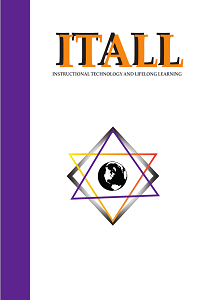E-Öğrenmeyi Desteklemek için Yapay Zeka Uygulamalarının Öğrenme Yönetim Sistemlerine Entegrasyonu
Yapay zekâ teknolojileri, öğrenme yönetim sistemlerinde çevrimiçi öğrenme deneyimlerini ve yönetimini önemli ölçüde geliştirme potansiyeline sahiptir. Özellikle Aralık 2022'de OpenAI'ın GPT-3 modeli çıktılarını herkese açık hale getirmesi yapay zekanın ulaştığı noktayı daha iyi anlamak için toplumsal bir fırsat yaratmıştır. Yapay zekanın e-öğrenme süreçlerinde kullanımı üzerine birçok çalışma olsa da bunların çok azında yapay zekâ uygulamalarının öğrenme yönetim sistemlerine entegrasyonu adım adım ve örneklerle sunulmaktadır. Bu çalışma, yapay zekâ teknolojilerinin öğrenme yönetim sistemlerine entegrasyon sürecini pratik örneklerle sunarak bu boşluğu doldurmayı amaçlamaktadır. Çalışmada; entegrasyon adımları ve kullanılabilecek örnek uygulamalara yer verilmiştir. Son olarak, GPT-3 modellerine ilişkin eklentilere yer evrilmiş ve Chat GPT'nin Moodle entegrasyonu için örnek JavaScript kodları sunulmuştur. Bu çalışma, yapay zekâ teknolojilerinin öğrenme yönetim sistemlerine entegrasyonu için pratik bir rehber sunarak literatüre katkıda bulunmaktadır.
Anahtar Kelimeler:
ChatGPT, Yapay Zeka, LMS, LXP, Moodle
Integrating AI Applications into Learning Management Systems to Enhance e-Learning
Artificial intelligence technologies have the potential to greatly enhance the organization of learning management systems and online learning experiences. In particular, the public release of OpenAI's GPT-3 model in December 2022 has given society a chance to learn more about the current status of artificial intelligence. There have been much research on the use of artificial intelligence in e-learning processes, but very few of them demonstrate how to integrate these applications step-by-step and with examples into learning management systems. This study intends to close this gap by demonstrating how artificial intelligence technologies are integrated into learning management systems using real-world examples. This study provides examples of practical applications as well as integration steps. Finally, GPT-3 plugins for Moodle are examined and sample JavaScript code is included for integrating Chat GPT into Moodle. By presenting a useful guide for integrating artificial intelligence technology into learning management systems, this work adds to the body of literature.
___
- Başkaya, F., & Karacan, H. (2022). Yapay Zekâ Tabanlı Sistemlerin Kişisel Veri Mahremiyeti Üzerine Etkisi: Sohbet Robotları Üzerine İnceleme. Bilişim Teknolojileri Dergisi, 15(4), 481-491.
- Bearman, M., Nieminen, J. H., & Ajjawi, R. (2022). Designing assessment in a digital world: an organising framework. Assessment & Evaluation in Higher Education, 1-14.
- Bennani, S., Maalel, A., & Ben Ghezala, H. (2022). Adaptive gamification in E‐learning: A literature review and future challenges. Computer Applications in Engineering Education, 30(2), 628-642.
- Clark, R. C., & Mayer, R. E. (2016). E-learning and the science of instruction: Proven guidelines for consumers and designers of multimedia learning. john Wiley & sons.
- Eggmann, N. (2022). Not Plug-and-Play: Successful Adoption of an AI-Based Learning Experience Platform. In Artificial Intelligence Education in the Context of Work (pp. 215-226). Cham: Springer International Publishing.
- Fariani, R. I., Junus, K., & Santoso, H. B. (2022). A Systematic Literature Review on Personalised Learning in the Higher Education Context. Technology, Knowledge and Learning, 1-28.
- Firat, M. (2023, January 12). How Chat GPT Can Transform Autodidactic Experiences and Open Education?. https://doi.org/10.31219/osf.io/9ge8m
- Kothari, G., & Verma, B. L. (2022). AI‐Implanted E‐Learning 4.0: A New Paradigm in Higher Education. Impact of Artificial Intelligence on Organizational Transformation, 305-325.
- Manciaracina, A. (2022). How to Design Learning Using Technology and Users’ Needs?. In Designing Hybrid Learning Environments and Processes: Interactive Communication Tools for Active Learning (pp. 93-128). Cham: Springer International Publishing.
- Pardamean, B., Suparyanto, T., Cenggoro, T. W., Sudigyo, D., Anugrahana, A., & Anugraheni, I. (2021, August). Model of Learning Management System Based on Artificial Intelligence in Team-Based Learning Framework. In 2021 International Conference on Information Management and Technology (ICIMTech) (Vol. 1, pp. 37-42). IEEE.
- Tapalova, O., & Zhiyenbayeva, N. (2022). Artificial Intelligence in Education: AIEd for Personalised Learning Pathways. Electronic Journal of e-Learning, 20(5), 639-653.
- Weigert, D., & Behrendt, F. (2022). Conceptual framework of a Learning Experience Platform (LXP) to strengthen AI competence by linking simulation technologies and AI. Proceedings of the 21st International Conference on Modelling and Applied Simulation (MAS), doi: 10.46354/i3m.2022.mas.024.
- Valdiviezo, A. D., & Crawford, M. (2020). Fostering soft-skills development through learning experience platforms (LXPs). In Handbook of Teaching with Technology in Management, Leadership, and Business (pp. 312-321). Edward Elgar Publishing.
- Yavuzarslan, M., & Çiğdem, E. (2022). Öğrenme yönetim sistemi log kayıtlarının akademik başarı tahmininde kullanılması. Bilişim Teknolojileri Dergisi, 15(2), 199-207.
- Başlangıç: 2020
- Yayıncı: Mustafa SARITEPECİ
Sayıdaki Diğer Makaleler
Zeynep ŞAHİN KONAŞ, Hatice YILDIZ DURAK
Çocuk Edebiyatı ve Anlayış Etiği
STEM ve Erken Cebir: Sınıf Öğretmenlerinin Uygulamalarından Yansımalar
Demet AYDOĞAN, Yasemin BÜYÜKŞAHİN
E-Öğrenmeyi Desteklemek için Yapay Zeka Uygulamalarının Öğrenme Yönetim Sistemlerine Entegrasyonu
